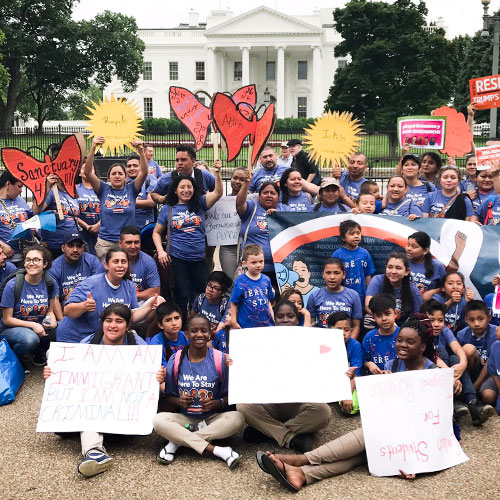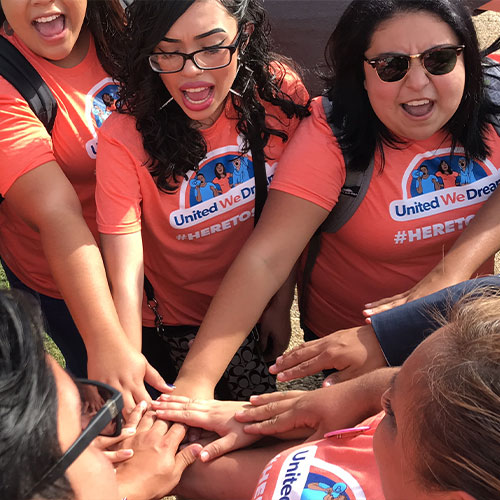We shouldn’t have to sit at a dinner table and defend our humanity, but here we are. For far too long, systems rooted in white supremacy, xenophobia, and colonialism have not only torn our communities apart but also infected our homes and families with lies. Anti-immigrant rhetoric, pushed by politicians like Donald Trump, has turned some of our own family members against us.
And yes, we are angry. Angry that we are forced to bear the burden of making our families see the harm in supporting white nationalist politicians and their policies. But we choose to organize our family from a place of love because we care about them. We won’t let these lies strip the humanity from the people we love or from ourselves. This guide is for undocumented folks who are tired of carrying this weight alone, offering tools to speak up with courage, truth, and just enough fire to challenge what’s harmful and unacceptable.
Step 1: Call Out the Lies with Curiosity
We don’t have time for debates built on myths, but starting with curiosity opens the door to real conversation. Asking thoughtful questions helps us understand where these ideas come from while also creating space to begin dismantling the fears and emotions fueling them.
The Cone of Curiosity: Start with open-ended questions and follow up to uncover deeper fears and emotions.
- What: “What makes you feel that way about immigrants?”
- How: “How does that make you feel?” (Gets to the emotions they’re experiencing.)
- Why: “Why does that make you feel that way?” (Helps uncover the root of their fears.)
Acknowledge their emotions genuinely:
- “I hear that you’re worried about safety / jobs / resources. A lot of people feel that way because it’s what we’ve been told—but let’s talk about whether it’s really true.”
- “It sounds like you’re afraid of losing something or being left behind. I want to understand where that fear is coming from.”
This step is about listening and showing empathy, even when it’s hard. Their fears might feel misguided, but they’re real to them—and understanding those emotions is key to dismantling them.
Step 2: Share Stories That Hit Home
They can argue with stats, but they can’t argue your story. Share your story or the story of someone you love. Make it personal, because this is personal.
- Say it with power: “You’re talking about people like me—your family—when you say things like that.”
- Connect it to them: “Imagine if our family had to flee like so many immigrant families. What would you do to protect us?”
- Show the impact: “When you repeat those lies, it makes it harder for families like ours to survive and thrive. I need you to understand that. You are putting me at risk.”
Step 3: Process the Conflict; Don’t Let It Slide
When tensions rise, meet them with courage. Avoiding the conversation doesn’t stop the harm. Conflict is uncomfortable, but you deserve to speak your truth.
- Name it: “I understand your feelings and where you are coming from, but your words have real consequences, and I need to challenge them. I hope you understand where I am coming from too.”
- Hold your ground: “It’s not okay to support policies that hurt people like me or our neighbors. We deserve dignity, period. You see who we are. We are real people who study, work, pay taxes, care for our families, and live our lives without harming others.”
- Center your values: “We care about family, community, and the dignity of every person. That’s what this is about—not fear or scapegoating.”
Step 4: Drop the Facts, Make Your Case
This is your chance to bring the conversation back to what’s right: the values of dignity, community, and humanity that we should all share. Instead of getting stuck in the lies, focus on the positive truth about immigrants and the solutions we should be fighting for. Use this moment to remind them what’s at stake—not just for you, but for all of us.
- Name the vision:
“We should have an efficient and humane immigration system that treats people with dignity and respect and allows families like ours to stay together. I want to thrive and feel like a full human being—not live in fear of being ripped away.” - Flip the narrative:
“Immigrants are part of the solution, not the problem. Let’s not fall for dehumanizing rhetoric that oversimplifies complex problems by demonizing entire groups of people.” - Remind them of who immigrants are:
“Undocumented immigrants are part of our economy, families, and neighborhoods. They’re our classmates, co-workers, family members, business owners, doctors, and customers. We are everywhere, and we are here to stay” - Lay out the stakes:
“The next administration has explicitly said they’ll militarize our communities and go after ALL undocumented families. That includes me. It’s not about going after ‘some’ immigrants—it’s about targeting people like me, people you love.” - Paint the reality of what could happen:
- “We’ll see the effects of mass deportations when your local bodega shuts down, when companies go under because workers and customers are deported—even though you didn’t know they were undocumented. When you have to give me or someone you love one last hug because we’re being deported. When home and food prices skyrocket because there aren’t enough farm workers or construction workers. When your community gets torn apart. We still have time to fight back, but we need to act now.”
This is the moment to speak from the heart and show them the big picture. Remind them that this isn’t just about policies—it’s about people, relationships, and the future of our families and communities. Lead with courage, clarity, and the deep belief that we’re fighting for something worth saving.
Step 5: End with Boundaries and Strength
Not every conversation will change a mind, and that’s not your burden to carry. Speak your truth, set your boundaries, and let them know you won’t compromise on your humanity.
- Set the line: “I love you, but I can’t stay silent when you repeat harmful lies. I need you to think about how this impacts me and our community.”
- Be clear: “If we can’t agree, that’s fine—but I won’t sit here while you talk like this.”
- End with hope: “I’m speaking up because I believe in a better future for all of us. I hope one day you’ll see that too.”
This Thanksgiving, we’re not just sitting at the table—we’re flipping it. Let’s meet the lies with truth, the fear with courage, and the division with solidarity. Together, we’ll dismantle the systems that harm us and build a future where we all belong.
In power, United We Dream 💛










